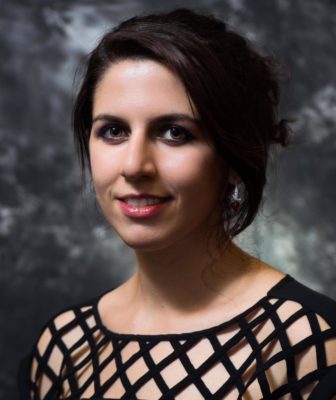Spotlight: Najva Akbari

“I’d say I became interested in non-academic paths because I realized it matters more to do what I love than to do it in a strictly defined path.”
Najva is a 4th year PhD student in Applied and Engineering Physics. She also serves on the BEST advisory board. She’s working on developing biomedical imaging tools. In her spare time, she likes drawing/painting (she’s hoping to get some of her art displayed at the Big Red Barn soon!) and watching movies. Najva recently landed a summer internship at Intel. If you’re interested in how/why, see the “Landing an Intel Internship” section below.
When and why did you become interested in non-academic careers?
I went through a rough time during my third year of my PhD. After a lot of introspection I realized that I was under a lot of stress and anxiety because I had this image of a perfect researcher in my head that I wanted to achieve: a scientist who publishes frequently and follows a traditional academic path (PhD to Post Doc to Faculty). It was very unhealthy to idolize this path and I realized it was keeping me from actually enjoying what I’m doing and living a happy, healthy life. So, I decided I was going to explore various interests and allow myself to do what I enjoy and see where it goes. I participated in a Science Policy Hackathon at MIT that was organized by a BESTie, Celine, whom I’ve since become good friends with. I attended some education research talks. I looked into scientific consulting firms and got in touch with a former BESTie, Nick Horton, who was super helpful and showed me around where he works (Exponent). I decided to look for a summer internship in industry to get a feeling for what the environment and work would be like and I got an offer from Intel Silicon Photonics Division. So I’d say I became interested in non-academic paths because I realized it matters more to do what I love than to do it in a strictly defined path.
What BEST activities have been the most useful to you?
The science policy hackathon that I found out about through BEST and attended was really helpful in exploring the field and also connecting with like-minded graduate students. I’ve also attended many interesting events around campus that I’ve found out about through BEST.
Landing an Intel Internship
A quick interview with Najva Akbari
Najva Akbari, a PhD student in Applied and Engineering Physics (see above) was recently awarded a summer internship at Intel in their Silicon Photonics Division. We asked her a few questions about her experiences and success in pursuing this great opportunity.
What made you interested in doing a summer internship during your graduate degree?
I wanted to explore all my options. I realized I was writing off industry without actually having any firsthand experience doing PhD level work in industry.
What attracted you to Intel?
I have been doing research in biomedical optics for over six years now. I really enjoy it but I’ve never experienced working on purely optics. The work at Intel is purely optics and it’s at a big company which is the type of experience that I’m missing and am curious about.
What will you do for the internship?
I will be designing methods to test and improve their optical transceiver system.
What was the interviewing process like?
I had a phone interview with four people on the other line. They asked me various questions ranging from my work style to details of what I’ve worked on and how it would fit with what they’re doing. I think being confident and finding analogies between the work I’m doing for my PhD and what they’re doing was very helpful. For example, I think what made me a good candidate is that I have a lot of experience using various optical and electronic tools in the lab. In my interview, I tried to explain how I’ve used those tools in an effort to show that I’m familiar with a lot of techniques and tools.
What about the internship are you most/least excited about?
I’m excited to learn more about silicon photonics. I’m excited to experience working in a big company. I’m worried about how I would fit in a large organization.
Any advice for other BESTies interested in landing internships in industry?
Be confident. As PhD students, it’s really easy to constantly compare ourselves to our advisors and seniors and feel inadequate. It’s important to identify and appreciate the skills that we’ve gained while working on our projects. It’s also important to identify where else those skills will be useful. And most importantly, I think it’s crucial to identify what you enjoy doing and to pursue just that.
Congratulations Najva, and best of luck!
by Cassi Wattenburger
This spotlight is from the time period of the NIH grant (Sept. 2013- Jun. 2019) to the Cornell BEST Program. As a result of the success of the grant funded period, Cornell University transformed BEST into a university-wide initiative “Careers Beyond Academia/BEST” to encompass all disciplines, and is now housed in the Graduate School.


